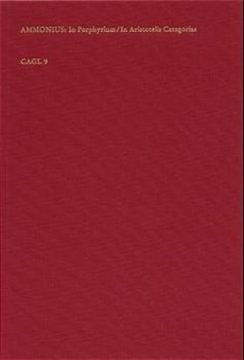Ammonius Hermeae (around 445–515 AD), the son of Hermeias of Alexandria in Egypt, is probably the most influential figure of Alexandrinian Neoplatonism. Evidence of his work as a teacher has been preserved not only in the form of his published works but also in the form of students‹ transcripts of his lectures. He was particularly known for his efforts to strike a balance between Neoplatonism and contemporary Christianity. On the one hand, this did ensure the subsequent survival of the Neoplatonic-pagan teaching tradition in Alexandria even under Emperor Justinian (527–565), and on the other hand it enabled the reception of the Aristotelian Organon in particular in Christian circles and thus ultimately in the Byzantine Empire. It was here that its impact on the Latin West originated in the 14th as well as in the 15th and 16th centuries. In his explanation of the work on categories, he continued in the tradition of Plotinus and in particular of his student Porphyrios, a tradition which was to see the categories not as an attempt to divide all forms of being into groups but as a categorization of the differences between the entities reflected in human predication.
- Veröffentlicht am Dienstag 1. Januar 2002 von frommann-holzboog
- ISBN: 9783772812293
- 110 Seiten
- Genre: Aufklärung, Hardcover, Philosophie, Renaissance, Softcover
